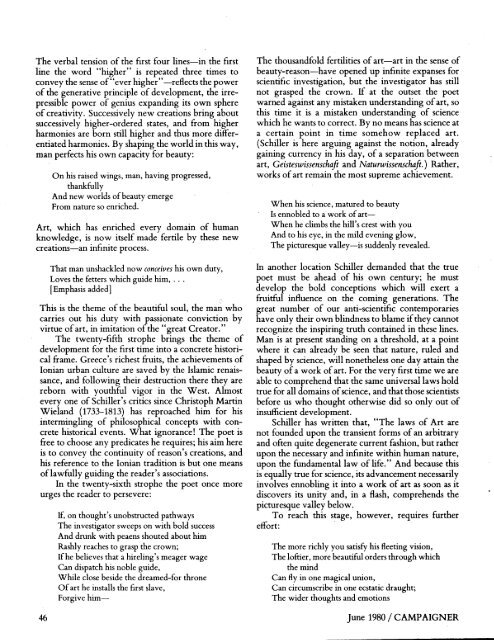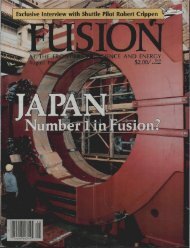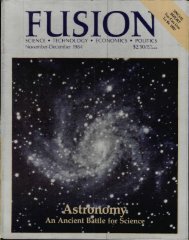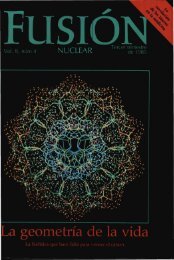Campaigner
Campaigner
Campaigner
You also want an ePaper? Increase the reach of your titles
YUMPU automatically turns print PDFs into web optimized ePapers that Google loves.
The verbal tension of the first four lines in the first The thousandfold fertilities of art--art in the sense of<br />
line the word "higher" is repeated three times to beauty-reason--have opened up infinite expanses for<br />
convey the sense of"ever higher" reflects the power scientific investigation, but the investigator has still<br />
of the generative principle of development, the irre- not grasped the crown. If at the outset the poet<br />
pressible power of genius expanding its own sphere warned against any mistaken understanding of art, so<br />
of creativity. Successively new creations bring about this time it is a mistaken understanding of science<br />
successively higher-ordered states, and from higher which he wants to correct. By no means has science at<br />
harmonies are born still higher and thus more differ- a certain point in time somehow replaced art.<br />
entiated harmonies. By shaping the world in this way, (Schiller is here arguing against the notion, already<br />
man perfects his own capacity for beauty: gaining currency in his day, of a separation between<br />
art, Geisteswissenschafiand Naturwissenschafi.) Rather,<br />
On his raised wings, man, having progressed,<br />
thankfully<br />
And new worlds of beauty emerge<br />
From nature so enriched.<br />
works of art remain the most supreme achievement.<br />
When his science, matured to beauty<br />
Is ennobled to a work of art--<br />
Art, which has enriched every domain of human When he climbs the hill's crest with you<br />
knowledge, is now itself made fertile by these new And to his eye, in the mild evening glow,<br />
creations--an infinite process. The picturesque valley--is suddenly revealed.<br />
That man unshackled now conceiveshis own duty, In another location Schiller demanded that the true<br />
Loves the fetters which guide him,.., poet must be ahead of his own century; he must<br />
[Emphasisadded] develop the bold conceptions which will exert a<br />
• fruitful influence on the coming generations. The<br />
This is the theme of the beautiful soul, the man who great number of our anti-scientific contemporaries<br />
carries out his duty with passionate conviction by have only their own blindness to blame if they cannot<br />
virtue of art, in imitation of the "great Creator." recognize the inspiring truth contained in these lines.<br />
The twenty-fifth strophe brings the theme of Man is at present standing on a threshold, at a point<br />
development for the first time into a concrete histori- where it can already be seen that nature, ruled and<br />
cal frame. Greece's richest fruits, the achievements of shaped by science, will nonetheless one day attain the<br />
Ionian urban culture are saved by the Islamic renais- beauty of a work of art. For the very first time we are<br />
sance, and following their destruction there they are able to comprehend that the same universal laws hold<br />
reborn with youthful vigor in the West. Almost true for all domains of science, and that those scientists<br />
every one of Schiller's critics since Christoph Martin before us who thought otherwise did so only out of<br />
Wieland (1733-1813) has reproached him for his insufficient development.<br />
intermingling of philosophical concepts with con- Schiller has written that, "The laws of Art are<br />
crete historical events. What ignorance! The poet is not founded upon the transient forms of an arbitrary<br />
free to choose any predicates he requires; his aim here and often quite degenerate current fashion, but rather<br />
is to convey the continuity of reason's creations, and upon the necessary and infinite within human nature,<br />
his reference to the Ionian tradition is but one means upon the fundamental law of life." And because this<br />
of lawfully guiding the reader's associations, is equally true for science, its advancement necessarily<br />
In the twenty-sixth strophe the poet once more involves ennobling it into a work of art as soon as it<br />
urges the reader to persevere: discovers its unity and, in a flash, comprehends the<br />
picturesque valley below.<br />
If, on thought's unobstructed pathways To reach this stage, however, requires further<br />
The investigator sweeps on with bold success effort:<br />
And drunk with peaens shouted about him<br />
Rashly reaches to grasp the crown;<br />
The more richly you satisfyhis fleeting vision,<br />
If he believesthat a hireling's meager wage<br />
The loftier, more beautiful orders through which<br />
Can dispatch his noble guide,<br />
the mind<br />
While close beside the dreamed-for throne<br />
Can fly in one magical union,<br />
Of art he installsthe first slave,<br />
Can circumscribe in one ecstatic draught;<br />
Forgive him--<br />
The wider thoughts and emotions<br />
46 June 1980 / CAMPAIGNER

















